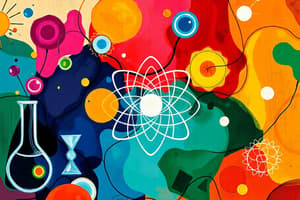Podcast
Questions and Answers
What is the primary focus of natural sciences?
What is the primary focus of natural sciences?
- Study of historical events and their impacts
- Study of abstract concepts and logical systems
- Study of living organisms and life processes (correct)
- Study of human behavior and societies
Which of the following is NOT a step in the scientific method?
Which of the following is NOT a step in the scientific method?
- Hypothesis formulation
- Analysis of results
- Data manipulation (correct)
- Experimentation
What distinguishes a scientific theory from a scientific law?
What distinguishes a scientific theory from a scientific law?
- A theory is a guess, while a law is a fact
- A theory is well-substantiated, while a law is based on repeated observations (correct)
- A theory is an untestable idea, while a law is tested and proven
- A theory is only applicable in specific conditions, whereas a law applies universally
What is a primary ethical consideration in scientific research?
What is a primary ethical consideration in scientific research?
Which branch of science focuses on numbers and quantities?
Which branch of science focuses on numbers and quantities?
What is a key benefit of engaging in scientific research?
What is a key benefit of engaging in scientific research?
What is an example of a social science?
What is an example of a social science?
Which of the following reflects current trends in science?
Which of the following reflects current trends in science?
Flashcards are hidden until you start studying
Study Notes
Definition of Science
- Systematic enterprise that builds and organizes knowledge in the form of testable explanations and predictions about the universe.
Branches of Science
-
Natural Sciences
- Study of natural phenomena.
- Includes:
- Physics: Study of matter, energy, and their interactions.
- Chemistry: Study of substances, their properties, and reactions.
- Biology: Study of living organisms and life processes.
-
Formal Sciences
- Study of abstract concepts and logical systems.
- Includes:
- Mathematics: Study of numbers, quantities, and shapes.
- Logic: Study of reasoning principles.
- Statistics: Study of data collection and analysis.
-
Social Sciences
- Study of human behavior and societies.
- Includes:
- Psychology: Study of the mind and behavior.
- Sociology: Study of social behavior and society.
- Economics: Study of production, consumption, and distribution of goods.
Scientific Method
- Steps involved:
- Observation: Gathering data through the senses.
- Question: Formulating a question based on observations.
- Hypothesis: Proposing a testable explanation.
- Experiment: Conducting experiments to test the hypothesis.
- Analysis: Analyzing data and results.
- Conclusion: Drawing conclusions that support or refute the hypothesis.
- Communication: Sharing findings with the scientific community.
Importance of Science
- Advances knowledge and understanding of the world.
- Drives technological innovation and medical advancements.
- Informs policy decisions and ethical considerations.
- Promotes critical thinking and problem-solving skills.
Key Concepts
- Theory: Well-substantiated explanation of some aspect of the natural world; supported by evidence.
- Law: Statement based on repeated experimental observations that describes some aspects of the universe.
- Experimentation: Fundamental process in science to test hypotheses and observe phenomena under controlled conditions.
Ethical Considerations in Science
- Importance of integrity and honesty in research.
- Issues of consent, privacy, and the use of animals in research.
- Responsible communication of scientific information to the public.
Current Trends
- Interdisciplinary research combining multiple fields.
- Increasing focus on sustainability and environmental science.
- Advances in artificial intelligence and data science impacting various disciplines.
Definition of Science
- A systematic approach that constructs and organizes knowledge through testable explanations and predictions regarding the universe.
Branches of Science
-
Natural Sciences: Investigate natural phenomena, encompassing:
- Physics: Examines matter, energy, and their relationships.
- Chemistry: Analyzes substances, their characteristics, and reactions.
- Biology: Explores living organisms and processes of life.
-
Formal Sciences: Focus on abstract concepts and logical frameworks, which include:
- Mathematics: Studies numbers, quantities, and geometric figures.
- Logic: Investigates principles of reasoning.
- Statistics: Involves data gathering and analysis.
-
Social Sciences: Examine human behavior and societies, incorporating:
- Psychology: Studies the mind and behavior patterns.
- Sociology: Analyzes social interactions and societal structures.
- Economics: Focuses on the production, consumption, and distribution of resources.
Scientific Method
- Involves a series of steps:
- Observation: Collecting data through sensory experiences.
- Question: Formulating queries based on collected data.
- Hypothesis: Formulating a testable proposition.
- Experiment: Designing and conducting tests to validate the hypothesis.
- Analysis: Interpreting data and drawing conclusions.
- Conclusion: Determining if the findings support or refute the hypothesis.
- Communication: Disseminating results to the scientific community.
Importance of Science
- Enhances knowledge and understanding of the natural world.
- Fuels technological and medical innovations.
- Influences policies and ethical considerations in society.
- Encourages critical thinking and problem-solving capabilities.
Key Concepts
- Theory: A robust explanation of a natural phenomenon, underpinned by substantial evidence.
- Law: A consistent observation-based statement that describes aspects of the universe.
- Experimentation: A crucial scientific method for validating hypotheses and observing conditions in a controlled environment.
Ethical Considerations in Science
- Emphasizes the need for integrity and honesty in research practices.
- Addresses issues of consent, privacy, and ethical treatment of animals in studies.
- Stresses the importance of responsible communication of scientific findings to the public.
Current Trends
- Promotes interdisciplinary research that integrates various scientific fields.
- Highlights a growing emphasis on sustainability and environmental considerations.
- Shows advancements in artificial intelligence and data science influencing a range of disciplines.
Studying That Suits You
Use AI to generate personalized quizzes and flashcards to suit your learning preferences.


